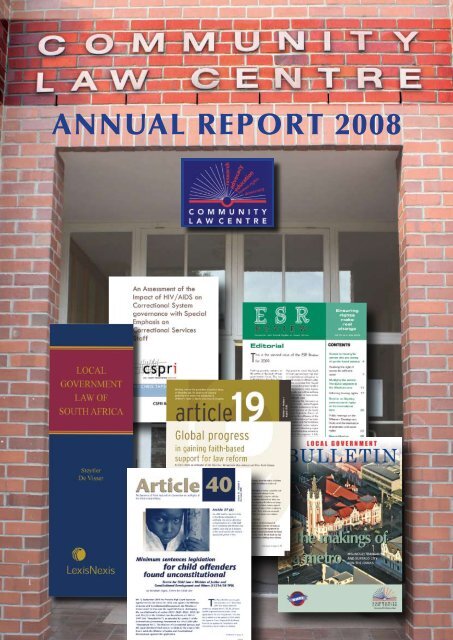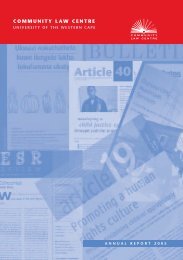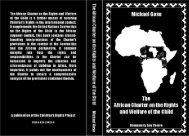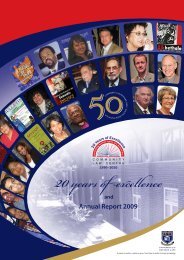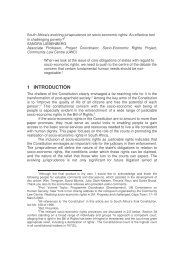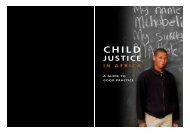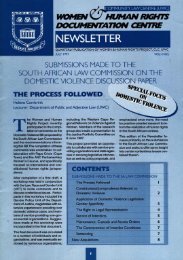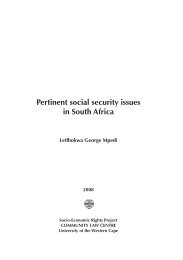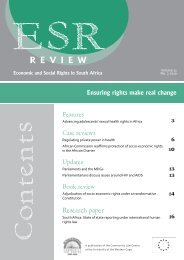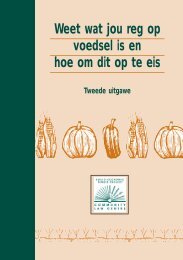printed version - Community Law Centre
printed version - Community Law Centre
printed version - Community Law Centre
You also want an ePaper? Increase the reach of your titles
YUMPU automatically turns print PDFs into web optimized ePapers that Google loves.
ANNUAL REPORT 2008
BOARD OF TRUSTEES<br />
The Rt. Revd Desmond Tutu, Chancellor of the University of the Western Cape (represented by Professor Christopher Tapscott,<br />
Dean of Economic and Management Sciences Faculty)<br />
Professor Renfrew Christie, Dean of Research (Chairperson of the Board)<br />
Professor Brian O’ Connell, Rector of the University of the Western Cape<br />
Professor Nico Steytler, Director of the <strong>Community</strong> <strong>Law</strong> <strong>Centre</strong><br />
Professor Najma Moosa, Dean of <strong>Law</strong> Faculty<br />
Professor Lovell Fernandez, <strong>Law</strong> Faculty Representative<br />
Professor Tobias van Reenen, <strong>Law</strong> Faculty Representative<br />
Mr Mubarak Sulaiman, <strong>Law</strong> Faculty Representative<br />
Advocate Karrisha Pillay, Public Representative<br />
Judge Vincent Saldanha, Public Representative<br />
Advocate Anwar Albertus, SC, Practising Advocate<br />
Mr Deon Visagie, Practising Attorney<br />
MANAGEMENT COMMITTEE<br />
Professor Renfrew Christie (Chairperson)<br />
Professor Najma Moosa<br />
Professor Tobias van Reenen<br />
Professor Nico Steytler<br />
Project Co-ordinators:<br />
Jacqui Gallinetti (Children’s Rights Project)<br />
Lukas Muntingh (Civil Society Prison Reform Initiative)<br />
Heléne Combrinck (Gender Project)<br />
Professor Jaap de Visser (Local Government Project)<br />
Sibonile Khoza (Socio-Economic Rights Project, until February)<br />
Dr Lilian Chenwi (Socio-Economic Rights Project, from March)<br />
STAFF<br />
Director: Professor Nico Steytler<br />
Children’s Rights Project: Jacqui Gallinetti (co-ordinator), Professor Julia Sloth-Nielsen (research fellow), Daksha Kassan (senior<br />
researcher), Benyam Mezmur (doctoral intern), Janine Demas (administrator)<br />
Civil Society Prison Reform Initiative: Lukas Muntingh (co-ordinator), Jamil Mujuzi (doctoral intern)<br />
Local Government Project: Professor Jaap de Visser (co-ordinator), Reuben Baatjies (researcher until August), Annette Christmas<br />
(researcher), Yonatan Fessha (doctoral intern until June), Douglas Singiza (doctoral intern from July), Valma Hendricks (administrator)<br />
Gender Project: Heléne Combrinck (co-ordinator), Lorenzo Wakefield (research assistant)<br />
Socio-Economic Rights Project: Sibonile Khoza (co-ordinator until February), Dr Lilian Chenwi (senior researcher, co-ordinator<br />
from March), Dr Christopher Mbazira (research fellow), Siyambonga Heleba (researcher), Rebecca Amollo (doctoral intern),<br />
Renchia du Plessis (administrator)<br />
Financial Manager: Virginia Brookes, Jody Bevie (bookkeeper)<br />
Librarian: Jill Claassen, Adromando Newan (library student assistant until March)<br />
Office Manager: Trudi Fortuin, Candice Pretorius (student assistant), Nelisa Martin (receptionist until August), Keathélia Sapto<br />
(receptionist from September)<br />
Research Fellow: Professor Kadar Asmal<br />
ADDRESS<br />
<strong>Community</strong> <strong>Law</strong> <strong>Centre</strong><br />
University of the Western Cape<br />
New Social Sciences Building<br />
Modderdam Road<br />
7535 Bellville<br />
Cape Town<br />
Tel: +27 21 959 2950 Fax: +27 21 959 2411<br />
Website: http://www.communitylawcentre.org.za
DIRECTOR’S OVERVIEW<br />
A prominent feature of a very successful 2008 was the international<br />
profile that the <strong>Community</strong> <strong>Law</strong> <strong>Centre</strong> and its researchers gained<br />
through their participation in the activities of international<br />
organisations.<br />
The <strong>Centre</strong> played a major role in bringing the South African jurisprudence<br />
and practice on socio-economic rights to the international arena. The Socio-<br />
Economic Rights Project made submissions, jointly with the NGO Coalition for<br />
an Optional Protocol to the International Covenant on Economic, Social and<br />
Cultural Rights, to the Open-Ended Working Group dealing with that matter.<br />
Through membership of the steering committee of the NGO Coalition, Dr Lilian<br />
Chenwi was involved in the process of drafting the Optional Protocol.<br />
The Children’s Rights Project attended the 11th and 12th sessions of the African<br />
Committee of Experts on the Rights and Welfare of the Child, and, at the<br />
12th session, presented a paper on the best interests of the African child. They<br />
also attended the Third International Policy Conference on the<br />
African Child.<br />
The Local Government Project provided advice on decentralisation<br />
and local government through its participation<br />
in the activities of the Department of Provincial and Local<br />
Government (in relation to the Democratic<br />
Republic of Congo), the World Bank, the<br />
Commonwealth Local Government Forum<br />
and the Forum of Federations.<br />
The <strong>Centre</strong>’s participation in the African<br />
Commission on Human and<br />
People’s Rights’ 43rd and 44th<br />
Ordinary Sessions led to a request<br />
from the Commission<br />
for the conclusion of a formal<br />
cooperation agreement<br />
under which the <strong>Centre</strong> will<br />
contribute to the Commission’s<br />
research activities.<br />
The international demand<br />
for the skills of the <strong>Centre</strong><br />
flows from the long, sustained<br />
and productive role<br />
the <strong>Centre</strong> has been playing<br />
in law reform in South Africa.<br />
This is best illustrated by the<br />
passing of the Child Justice<br />
Bill, a law reform project that<br />
Trudi Fortuin, Nico Steytler<br />
and Heléne Combrinck<br />
COMMUNITY LAW CENTRE Annual Report 2008
has been the focus of the Children’s Rights Project since its inception 18 years<br />
ago. It is no coincidence that the passing of the law coincided with the tenth<br />
year of Article 40, a journal that popularises and advocates the new concept of<br />
child justice, and the production of two books by Julia Sloth-Nielsen, a fellow of<br />
the <strong>Centre</strong>, with chapters contributed by Project staff and a doctoral intern.<br />
Having established itself over the past decade as one of the foremost research<br />
institutions in South Africa on human rights and democracy, the <strong>Centre</strong><br />
was also gratified to be nominated in 2008 by the South African Department of<br />
Foreign Affairs for the international UNESCO/Bilbao Prize for the Promotion of<br />
a Culture of Human Rights.<br />
The role that the <strong>Centre</strong> plays both internationally and domestically is the<br />
product of its excellence in research. This was underscored by the awarding<br />
of two doctorates: one in March, to Jacqui Gallinetti, the co-ordinator of the<br />
Children’s Rights Project, on the use of children in the commission of crimes as<br />
the worst form of child labour, and the other in September, to Yonatan Fessha, a<br />
doctoral intern, on the accommodation of ethnicity in the Ethiopian and South<br />
African constitutions. The number of peer-reviewed publications by staff has<br />
also increased significantly.<br />
Staff<br />
The <strong>Centre</strong> bade farewell to Sibonile Khoza, the coordinator of the Socio-Economic<br />
Rights Project, who was appointed to a senior position in the Office of<br />
the Premier of the Western Cape. Dr Lilian Chenwi was appointed<br />
project co-ordinator in his place. Reuben Baatjies,<br />
a researcher in the Local Government Project, also joined<br />
the Western Cape Premier’s Office. The <strong>Centre</strong> received<br />
two doctoral interns: Rebecca Amollo from Uganda and<br />
Douglas Singiza from Uganda. The <strong>Centre</strong> was most fortunate<br />
to have Professor Kader Asmal accept a position as<br />
a research fellow of the <strong>Centre</strong>. Dr Christopher Mbazira<br />
from Makerere University, Uganda, was also appointed as<br />
a research fellow.<br />
The <strong>Centre</strong> celebrated the long service of two stalwarts:<br />
Heléne Combrinck, coordinator of the Gender Project,<br />
with ten years of research excellence, and Trudi Fortuin,<br />
the office manager, with ten years of outstanding service<br />
to the <strong>Centre</strong>.<br />
Fifth Dullah Omar Memorial Lecture<br />
The Fifth Dullah Omar Memorial Lecture was delivered<br />
by the Chancellor of the University of the Western Cape,<br />
Archbishop Emeritus Desmond Tutu, on 27 March. The<br />
Archbishop gave a most challenging lecture on the state of<br />
democracy in South Africa. It enjoyed wide media coverage<br />
and the speech was published in the journal <strong>Law</strong> Democracy<br />
and Development.<br />
COMMUNITY LAW CENTRE Annual Report 2008
Finances<br />
The <strong>Centre</strong> had a very successful financial year in 2008. It raised R10.6 million, an<br />
increase of 17 percent over 2007’s funds. A third of the income was derived from<br />
tenders, consultations and other service-related activities, indicating a range of<br />
sources of income. This safeguards the long-term sustainability of the <strong>Centre</strong>.<br />
The expenditure of the <strong>Centre</strong> was ten percent higher than the previous year.<br />
The <strong>Centre</strong> continues to maintain sound financial management. Apart from<br />
the overall audit of the university’s books, three quarters of the <strong>Centre</strong>’s donor<br />
agreements were externally audited and all received unqualified audits. The<br />
<strong>Centre</strong> wishes to thank all its donors for supporting the work of its projects. Particular<br />
acknowledgement goes to the Ford Foundation for generously providing<br />
both core funding for administration and project-based funding. Support received<br />
from the University in the form of office space, utilities, information and<br />
communications technology assistance, and human and financial management<br />
services is also gratefully acknowledged.<br />
Annual report<br />
This report highlights the <strong>Centre</strong>’s main activities and research products for<br />
2008. For a full report on all the <strong>Centre</strong>’s activities, please visit our website: http://<br />
www.communitylawcentre.org.za/Publications/annual-reports<br />
RESEARCH<br />
In-depth and cutting-edge research is the basis of the <strong>Centre</strong>’s<br />
activities, since it informs and guides our outreach programmes.<br />
This year marked a concerted effort by the Children’s Rights Project around advocacy<br />
in relation to the Child Justice Bill and preparing for the implementation<br />
of the Children’s Act, 2005. Jacqui Gallinetti and Julia Sloth-Nielsen provided<br />
commentary on selected chapters of the Children’s Amendment Act, 2007, for<br />
the second edition of A Commentary on the Children’s Act. The Project also contributed<br />
to a chapter on children in the forthcoming Commentary on the Sexual<br />
Offences Act. Furthermore, Sloth-Nielsen provided a detailed comparison of<br />
the different reporting procedures in the Sexual Offences Act and Children’s<br />
Act, highlighting overlaps and inconsistencies in a way that provides clarity in a<br />
somewhat problematic cross-cutting area of the law.<br />
Sloth-Nielsen and Benyam Mezmur have also produced a wealth of critical<br />
thought on issues relating to children’s rights from the African perspective.<br />
COMMUNITY LAW CENTRE Annual Report 2008
Their work includes articles on the work of the African Committee of Experts<br />
on the Rights and Welfare of the Child, as well as commenting on the African<br />
Charter on the Rights and Welfare of the Child.<br />
Research by the Civil Society Prison Reform Initiative (CSPRI) focused on the<br />
areas of HIV and AIDS in the prison system, the prevention and combating of<br />
torture, the African human rights framework, offender reintegration, sentencing<br />
reform, violence and sexual violence in prisons, and the prevention and<br />
combating of corruption. Research was also undertaken on alternative sentencing<br />
under the African human rights instruments, as well as recent developments<br />
in case law from other African countries. The research culminated in a number<br />
of publications, including a plain language guide to the UN Convention against<br />
Torture in South Africa. The research has confirmed the important role that civil<br />
society has to play in ensuring that South Africa complies with its obligations<br />
under the UN Convention against Torture.<br />
An estimated 5 000 sentenced prisoners are released from South Africa’s prisons<br />
every month. Research was undertaken to track a Cape Town-based sample<br />
of prisoners from before their release to after, to investigate and record their experiences.<br />
Lukas Muntingh also completed research on the potential impact of<br />
the Sexual Offences Act, 2007, on prisoners as well as the obligations created for<br />
the Department of Correctional Services. CSPRI and the Institute for Security<br />
Studies are cooperating on two research projects, one relating to repeat violent<br />
offending and the other to the review of the criminal justice system undertaken<br />
by the Department of Justice and Constitutional Development. A joint project<br />
between CSPRI and the <strong>Centre</strong> for the Study of Violence and Reconciliation<br />
has also commenced and is aimed at gaining a better understanding of prison<br />
violence.<br />
The Socio-Economic Rights Project conducted research on several topics, including<br />
housing rights and evictions, the housing rights of women experiencing<br />
gender-based violence, public participation in service delivery, the socioeconomic<br />
rights obligations of local government, the health rights of women<br />
experiencing HIV/AIDS, social security and the enforcement of court orders.<br />
This research has produced seven research papers: five have been accepted or<br />
submitted for publication in peer-reviewed journals and two have been published<br />
in research series. One research series paper is entitled, You Are the ‘Weakest Link’<br />
in Realising Socio-Economic Rights: Goodbye – Strategies for Effective Implemen-<br />
COMMUNITY LAW CENTRE Annual Report 2008
tation of Court Orders in South Africa (Research Series 3). The<br />
other is entitled Pertinent Social Security Issues in South Africa<br />
(Research Series 4).<br />
The Gender Project conducted research on whether<br />
existing training programmes provide police officials<br />
with the knowledge and skills to apply the Domestic<br />
Violence Act, 1998, in practice. This research consisted<br />
of in-depth interviews with police officials and station<br />
commissioners at 20 police stations in the Western<br />
Cape, as well as with members of oversight bodies,<br />
including the Independent Complaints Directorate<br />
and the provincial Department of <strong>Community</strong><br />
Safety.<br />
The Project continued its research on the<br />
role of firearms in domestic violence. It commenced<br />
with the final part of the fieldwork,<br />
which aims to investigate the role of the police<br />
in determining whether a perpetrator of<br />
domestic violence should be declared unfit to possess<br />
a firearm.<br />
The Project also conducted research on different aspects of violence<br />
against women with disabilities. Firstly, Heléne Combrinck examined<br />
sexual assault against persons with intellectual disabilities for purposes of a<br />
chapter in the forthcoming Commentary on the Sexual Offences Act; secondly,<br />
the Project carried out exploratory work on the criminal justice response<br />
to violence against women with disabilities.<br />
The Local Government Project has been involved in research to develop<br />
solutions to institutional problems in local government. In the first<br />
half of 2008, the Project engaged intensively with the national review<br />
of provincial and local government by the Department of Provincial<br />
and Local Government. A roundtable conference was organised in<br />
March to discuss the major themes of the local government review.<br />
In that context, the Project produced research papers on the principle<br />
of subsidiarity in local government, conflicts between district<br />
and local municipalities, the financing of infrastructure needed<br />
for basic services, accountability tools for municipal councils,<br />
property rates policies and the effects of the overregulation of<br />
local government.<br />
In May the Project formally launched another flagship<br />
publication, Local Government <strong>Law</strong> of South Africa (2007), a<br />
loose-leaf textbook analysing and critiquing local government<br />
legislation, at the <strong>Centre</strong> for the Book in Cape Town.<br />
Chief Justice Pius Langa’s address for the launch was on<br />
the constitutionalisation of local government.<br />
Nico Steytler and Jaap de Visser also contributed a<br />
chapter on local government, which was published in<br />
Constitutional <strong>Law</strong> of South Africa.<br />
COMMUNITY LAW CENTRE Annual Report 2008
COMMISSIONED RESEARCH<br />
Because of its reputation for high-quality research, the <strong>Centre</strong><br />
is frequently commissioned to undertake applied research for<br />
government departments and non-governmental bodies.<br />
Staff of Save the Children,<br />
Swaziland<br />
The Children’s Rights Project was again requested by Save the Children Swaziland<br />
to assist them in their child law reform efforts. The Project also produced a<br />
manual on the Children’s Act, 2005, the Children’s Amendment<br />
Act, 2007, and regulations for the Western Cape Department<br />
of Social Development.<br />
The Civil Society Prison Reform Initiative (CSPRI) is managing,<br />
on behalf of the University of the Western Cape, a<br />
three-year project to monitor the implementation of the<br />
Correctional Services Act, 1998. CSPRI was also commissioned<br />
by the CSIR to conduct research on the role of the<br />
police in offender reintegration, as part of a larger project<br />
on community safety in the Western Cape.<br />
The Local Government Project conducted research, commissioned<br />
by the South African Local Government Association<br />
(Salga) and the German Development Agency (GTZ),<br />
on the reasons for the failure of many South African municipalities<br />
to establish and maintain transparent, accountable<br />
and responsive administration. The Project also provided research reports on the<br />
management of the Cango Caves and the identification of essential municipal<br />
by-laws and policies for the Western Cape Department of Local Government and<br />
Housing, and drafted a Privileges and Immunities of Councillors Bill.<br />
INFORMING PUBLIC<br />
DEBATE ON LAW REFORM<br />
On a number of occasions, parliamentary committees requested<br />
the <strong>Centre</strong>’s comments on draft legislation. In addition, the<br />
<strong>Centre</strong>’s projects made submissions to international human rights<br />
bodies.<br />
COMMUNITY LAW CENTRE Annual Report 2008
This year saw the culmination of over a decade of work by the Children’s Rights<br />
Project on the finalisation of the Child Justice Bill. The Project, in its capacity<br />
as co-ordinator of the Child Justice Alliance, arranged civil society<br />
participation in the public hearings in February 2008. It played a<br />
central role in presenting civil society’s position on each provision<br />
in the Bill during the parliamentary deliberations.<br />
The Civil Society Prison Reform Initiative (CSPRI) presented two<br />
papers at the Commonwealth Secretariat conference in Gaborone,<br />
Botswana, on Alternative Sentencing in Small Commonwealth Jurisdictions<br />
in the Southern Africa Region. The use of non-custodial sentencing<br />
options in Africa remains fraught with challenges and it is believed that the<br />
Commonwealth can play a significant role in promoting the use of these options.<br />
CSPRI maintained a productive working relationship with Parliament, specifically<br />
the Portfolio Committee on Correctional Services, the Portfolio Committee<br />
on Justice and Constitutional Development and the Portfolio Committee<br />
on Social Development. A number of written and oral submissions<br />
were made to these committees on subjects including the<br />
Correctional Services Budget Vote, deaths in custody, medical<br />
parole, the annual report of the Department of Correctional<br />
Services and the Child Justice Bill. CSPRI paid particular attention<br />
to sentencing and the monitoring of children in custody, as<br />
proposed under the UN Convention Against Torture and other<br />
Cruel, Inhuman or Degrading Treatment or Punishment (CAT)<br />
and the Optional Protocol to CAT. Other submissions focused on South Africa’s<br />
obligations under CAT and its Optional Protocol, audio-visual links between<br />
courts and prisons for the purpose of trial postponements and the expungement<br />
of criminal records. Furthermore, CSPRI made a written submission on<br />
the Prevention of and Treatment for Substance Abuse Bill, 2008, and focused on<br />
the prevention of torture and ill-treatment in drug rehabilitation centres.<br />
The Gender Project, together with the Saartjie Baartman Legal Advice and<br />
Training Project, made a submission on the Review of the South African Criminal<br />
Justice System to the Portfolio<br />
Committee on Justice and Constitutional<br />
Development and the Portfolio<br />
Committee on Safety and Security. The<br />
submission focused on the need for<br />
the ‘7-Point Plan’, which forms the basis<br />
of the Review, to take gender-based<br />
offences into consideration.<br />
The Gender Project (with the Saartjie<br />
Baartman <strong>Centre</strong>) developed three information<br />
posters on the need to improve<br />
the criminal justice response to violence against women with disabilities.<br />
The posters formed part of the ‘Sixteen Days of Activism on Gender-Based Violence’<br />
Campaign and were distributed to partner organisations nationally.<br />
The Local Government Project made submissions on the Land Use Management<br />
Bill, 2008, and on the draft Single Public Service Bill. Furthermore, the<br />
Project submitted its views on the Western Cape Liquor Bill to the Western Cape<br />
Provincial Parliament and on the Child Care Regulations to the Department of<br />
Social Development.<br />
COMMUNITY LAW CENTRE Annual Report 2008
The Socio-Economic Rights Project made a submission to the City of Cape<br />
Town on the implementation of the Hostels to Homes Project in the area of<br />
Guguletu. The Project also wrote letters to the Minister of Justice and Constitutional<br />
Development, the Minister of Foreign Affairs and the South African Permanent<br />
Mission in Geneva on the drafting process of the Optional Protocol to<br />
the International Covenant on Economic, Social and Cultural Rights (OP-ICE-<br />
SCR). Together with other organisations, it also submitted a joint appeal letter<br />
to states to ensure the finalisation and adoption of the OP-ICESCR.<br />
EDUCATION, TRAINING &<br />
INFORMATION SHARING<br />
One of the <strong>Centre</strong>’s core activities is to disseminate its expertise<br />
and research results to the community at large through education<br />
programmes, training workshops, publications and the website.<br />
Education programmes<br />
The <strong>Centre</strong> once again presented the bulk of the LLM Module on Constitutional<br />
Litigation at the University of the Western Cape, which included courses on<br />
• children’s rights;<br />
• criminal justice and the constitution;<br />
• socio-economic rights;<br />
• intergovernmental relations; and<br />
• constitutional law practice.<br />
The <strong>Centre</strong> continued its partnership with Pretoria, Makerere, Ghana, Cameroon<br />
and Eduardo Mondlane universities in presenting the LLM in Human Rights and<br />
Democratisation in Africa for students from across the continent. In the second<br />
semester, it hosted six students who were attending the LLM courses offered by<br />
the University of the Western Cape and completed their dissertations with the<br />
<strong>Centre</strong>.<br />
Popular publications<br />
The <strong>Centre</strong> produced a number of journals that communicated the <strong>Centre</strong>’s<br />
research results to a wider audience.<br />
Article 40<br />
This publication, which has been dedicated to child justice issues since<br />
1999, marked its tenth year in 2008. The 3 500 copies of each edition<br />
were distributed widely, both within South Africa and abroad.<br />
COMMUNITY LAW CENTRE Annual Report 2008
Article 19<br />
The Children’s Rights Project also produced two issues of Article 19, a popular<br />
journal dedicated to disseminating diverse and relevant information<br />
advocating a prohibition on corporal punishment. Three thousand copies<br />
of each issue were distributed.<br />
CSPRI 30 Days/Dae/Izinsuku and CSPRI Newsletter<br />
During 2008, 11 issues of CSPRI 30 Days/Dae/ Izinsuku were published<br />
electronically. This monthly summary of media reporting<br />
on prison-related matters in Africa has proven an invaluable<br />
source for tracking events and trends in reporting on prison issues.<br />
Five issues of the CSPRI Newsletter were published. Both<br />
newsletters were circulated to more than 1 000 subscribers.<br />
ESR Review<br />
The Socio-Economic Rights Project produced four issues of<br />
the ESR Review, with 2 500 copies per issue distributed both nationally<br />
and internationally.<br />
Local Government Bulletin<br />
This highly successful publication celebrated its tenth anniversary<br />
in 2008 with five issues, each of which was eagerly read<br />
by local government practitioners across the country. The<br />
number of pages per issue was increased from 20 to 28. The<br />
Bulletin has a print-run of 11 000 copies and over 60 percent<br />
of municipalities are paid-up subscribers.<br />
Other popular publications<br />
The Socio-Economic Rights Project produced four popular<br />
publications. The first was Evictions in South Africa: Relevant<br />
International and National Standards, which provides useful<br />
and accessible information on the substantive and procedural<br />
standards in international and national law relating<br />
to evictions. The second was the updated edition of<br />
the booklet Knowing and Claiming Your Right to Food,<br />
which has updated information on what the ‘right to food’<br />
means. The booklet is available in four languages – English,<br />
Afrikaans, IsiXhosa and IsiZulu – and has been distributed<br />
widely. The third, You Are the ‘Weakest Link’ in Realising<br />
Socio-Economic Rights: Goodbye – Strategies for Effective<br />
Implementation of Court Orders in South Africa, was<br />
published as Socio-Economic Rights Project Research<br />
Series 3. The fourth, Pertinent Social Security Issues in<br />
South Africa, was published as Socio-Economic Rights<br />
Project Research Series 4.<br />
COMMUNITY LAW CENTRE Annual Report 2008
OCIO-ECONOMIC RIGHTS PROJECT<br />
3<br />
You are the “weakest link”<br />
in realising socio-economic<br />
rights: Goodbye<br />
Strategies for effective implementation<br />
of court orders in South Africa<br />
RESEARCH SERIES<br />
Christopher Mbazira<br />
SOCIO-ECONOMIC RIGHTS PROJECT<br />
4<br />
Pertinent social security issues<br />
in South Africa<br />
Letlhokwa George Mpedi<br />
RESEARCH SERIES<br />
Workshops and training programmes<br />
The Children’s Rights Project was involved in two important training initiatives<br />
in relation to the Children’s Act, 2005. First, the Western Cape<br />
Department of Social Development contracted the University of the<br />
Western Cape to train social workers across the province. The Project<br />
accordingly assisted in eight three-day training workshops at various<br />
venues in the Western Cape, and more than 400 social workers have<br />
been trained on the legislation so far. The Project is also developing<br />
a 200-page training manual on the new legislation for the Western<br />
Cape Department of Social Development. In addition the Project<br />
is developing training materials on the Children’s Act, Children’s<br />
Amendment Act and its Regulations for the national Department<br />
of Social Development. The Project was contracted to<br />
undertake the development of these materials in 2008 and the<br />
first phase has been completed.<br />
The Civil Society Prison Reform Initiative held training workshops<br />
with civil society organisations in Polokwane, Witbank and<br />
Klerksdorp. The workshops, which focused on prisoners’ rights, parole,<br />
the prevention of torture and dealing with prison corruption,<br />
engaged about 60 participants from civil society.<br />
In partnership with the Saartjie Baartman <strong>Centre</strong>, the Gender<br />
Project presented workshops in Cape Town and Hermanus on<br />
violence against women with disabilities, as part of the ‘Sixteen<br />
Days of Activism on Gender-Based Violence’ Campaign. It also hosted<br />
a workshop on the implementation of the Sexual Offences Act,<br />
2007, in relation to persons with intellectual disabilities, in partnership<br />
with the UWC Legal Aid Clinic.<br />
The Local Government Project conducted a series of training<br />
sessions with officials of the Western Cape Department of Local<br />
Government and Housing, as well as a two-day training workshop<br />
with municipal officials from the province.<br />
The Socio-Economic Rights Project hosted two seminars<br />
and a conference. A seminar on rights, legal empowerment<br />
and poverty reduction was held in June, a conference on<br />
public participation in service delivery as a means of<br />
strengthening the realisation of socio-economic rights<br />
followed in July, while a seminar on critical socio-economic<br />
rights issues, focusing on the right of access to food,<br />
social security and the enforcement of court orders was also<br />
held in July.<br />
In February the Gender Project and the Socio-Economic<br />
Rights Project organised an introductory meeting of the<br />
Western Cape Transitional and Special Needs Housing<br />
Forum, together with the Shelter Focus Group (Western<br />
Cape) and ACG architects.<br />
10 COMMUNITY LAW CENTRE Annual Report 2008
OTHER ACTIVITIES<br />
Amicus curiae litigation<br />
The Socio-Economic Rights Project continues to contribute to the development<br />
of jurisprudence on socio-economic rights that is responsive to the needs of<br />
the poor and marginalised groups in South Africa. Together with the <strong>Centre</strong> on<br />
Housing Rights and Evictions, the Project intervened as amicus curiae in the case<br />
of Various Occupants v Thubelisha Homes and Others Case No CCT 22/08. This<br />
case concerns the eviction of residents of Joe Slovo, one of Cape Town’s biggest<br />
informal settlements, to make way for formal housing as part of a government<br />
project. The eviction order of the Cape High Court was appealed directly to the<br />
Constitutional Court. The case was heard by the Constitutional Court in August<br />
and the Court is still to hand down its judgment.<br />
International assistance and collaboration<br />
As noted in the introduction, Julia Sloth-Nielsen and Benyam Mezmur attended<br />
the 11th and 12th sessions of the African Committee of Experts on the Rights<br />
and Welfare of the Child, and, at the 12th session, presented a paper on the best<br />
interests of the African child. Moreover, they drafted a paper on the Right of the<br />
Child to Education in Emergency Situations for the United Nations Committee<br />
on the Rights of the Child’s Day of General Discussion. The Project was also invited<br />
by UNICEF to attend the consultation of legal experts in Bern, Switzerland, in<br />
preparation for the Third World Congress against Sexual Exploitation of Children,<br />
and to make a presentation on Promoting Cross-Departmental Cooperation and<br />
Allocation of Resources for National <strong>Law</strong> Reform and Implementation.<br />
The amicus team at the<br />
Constitutional Court<br />
COMMUNITY LAW CENTRE Annual Report 2008 11
International NGO<br />
Coalition members with<br />
the chairperson of the<br />
Open-Ended Working<br />
Group on an OP-ICESCR<br />
In cooperation with the Judicial Inspectorate of Prisons and the US-based organisation<br />
Stop Prisoner Rape, CSPRI presented and participated at a workshop<br />
hosted by Stop Prisoner Rape in April. Three months later CSPRI presented and<br />
facilitated a session on prisoners’ rights at a training workshop for officials of<br />
the Department of Correctional Services. The workshop, hosted by Stop Prisoner<br />
Rape, focussed on preventing sexual violence in prisons.<br />
In December CSPRI formed part of an International Bar Association delegation<br />
hosted by the British High Commission to Cameroon to carry out a scoping<br />
study on torture and investigate prison conditions in that country.<br />
Nico Steytler was the theme editor of Local Government and Metropolitan<br />
Regions in Federal Systems, the sixth volume in the Global Dialogue on Federalism<br />
series, a leading international series sponsored by the Forum of Federations<br />
and the International Association of Centers of Federal Studies. Steytler is also<br />
a member of the editorial advisory committee of the Global Dialogue on Federalism.<br />
In addition, he has been asked to serve on the committee of experts<br />
to advise the Forum of Federations and the Ethiopian government on the next<br />
International Conference on Federalism to be held in Addis Abeba in 2010. He<br />
also participated as an expert in a World Bank and Swiss Government seminar<br />
for the Constitution Reform Committee of the Iraqi Parliament on second<br />
houses of parliament.<br />
Jaap de Visser was commissioned by the World Bank’s Independent Evaluation<br />
Group as an external expert for a conference on public sector reform in Africa.<br />
The Socio-Economic Rights Project continued to be actively involved in the<br />
process of drafting the Optional Protocol to the International Covenant on Economic,<br />
Social and Cultural Rights (OP-ICESCR), through Lilian Chenwi’s membership<br />
of the steering committee of the NGO Coalition for an OP-ICESCR. Chenwi<br />
attended the African Regional Meeting on an OP-ICESCR organised by<br />
the government of Egypt, together with the United Nations Office of the High<br />
Commissioner for Human Rights, held in Cairo in January. She also participated<br />
in the Third Committee of the 63rd Session of the General Assembly held<br />
at the United Nations Headquarters in New York in November, during which<br />
the report of the Human Rights Council, including the OP-ICESCR, was considered.<br />
Chenwi also participated in the Fifth Session of the Open-Ended Working<br />
Group on an OP-ICESCR held in Geneva in February, March and April, making<br />
oral presentations on various provisions of the then draft optional protocol. Together<br />
with the other organisations forming<br />
the NGO Coalition, the Project also made a<br />
written submission. The OP-ICESCR work has<br />
been successful, as the United Nations General<br />
Assembly adopted the Optional Protocol<br />
by consensus in December.<br />
The Project became a member of the International<br />
Network for Economic, Social and<br />
Cultural Rights (ESCR-Net). It participated in<br />
an international strategy meeting on economic,<br />
social and cultural rights and an ESCR-Net<br />
General Assembly meeting held in Nairobi in<br />
December, represented by Lilian Chenwi, who<br />
made a presentation on the OP-ICESCR, the<br />
next steps and future challenges.<br />
12 COMMUNITY LAW CENTRE Annual Report 2008
INCOME & EXPENDITURE STATEMENT<br />
INCOME<br />
2008 2007<br />
Funders 6 872 331.78 6 274 344.22<br />
Consultancies 3 227 088.72 2 203 186.47<br />
Other 531 637.51 575 318.91<br />
TOTAL INCOME 10 631 058.01 9 052 849.60<br />
EXPENDITURE<br />
Advertising 17 456.07 0.00<br />
Audit Fees 77 533.67 45 140.00<br />
Bank Charges 1 686.22 2 022.83<br />
Computer Equipment 147 941.66 40 245.87<br />
Conferences, Seminars & Workshops 325 628.91 113 390.46<br />
Consultation Fees 1 524 788.25 1 214 593.82<br />
Equipment 0.00 49 144.54<br />
Functions & Catering 90 388.99 96 227.87<br />
Litigation 0.00 70 256.94<br />
Partner Activities 80 747.72 256 782.20<br />
Photocopying & Postage 294 572.71 283 726.58<br />
Post-Graduate Bursaries 313 565.55 231 642.00<br />
Publications 1 128 903.80 1 014 595.38<br />
Research 85 113.95 207 500.00<br />
Returned to Funder 217 882.90 190 384.05<br />
Salaries 3 816 751.91 3 971 426.73<br />
Staff Development 64 658.46 38 935.21<br />
Stationery 153 913.17 119 893.41<br />
Subscriptions & Books 184 158.31 61 170.46<br />
Telephone 62 260.81 63 053.10<br />
Travelling 1 146 605.09 948 329.50<br />
Website 36 421.00 36 788.72<br />
TOTAL EXPENDITURE 9 770 979.15 9 055 249.67<br />
CLOSING BALANCE FOR YEAR 860 078.86 -2 400.07<br />
Surplus carried forward from previous year 4 917 869.38 4 953 769.47<br />
Prior Year Adjustment 201 222.89 -33 500.02<br />
NET CLOSING BALANCE 2008 5 979 171.13 4 917 869.38<br />
FUNDERS<br />
Core funding and project activities: Ford Foundation<br />
Children’s Rights Project: Open Society Foundation of SA (Child Justice Alliance and Article 40); Save the Children<br />
Sweden (Article 19 and Corporal Punishment Advocacy); National Department of Social Development (training<br />
materials).<br />
CSPRI: Open Society Foundation of SA and Rockefeller Brothers Foundation<br />
Gender Project: Open Society Foundation of SA (Training for SAPS members on the Domestic Violence Act<br />
Local Government Project: Austrian Development Cooperation, MOTT Foundation and Conference, Workshop and<br />
Cultural Initiative (CWCI) Fund<br />
Socio-Economic Rights Project: Nowegian <strong>Centre</strong> for Human Rights, University of Oslo (Implementing socioeconomic<br />
rights in SA)<br />
Joint projects (Local Government and Socio-Economic Rights projects): Dutch Interchurch Organisation for<br />
Development Cooperation (ICCO) (Local government and access to basic services)<br />
Dullah Omar Memorial Lecture: Webber Wentzel, incorporating Mallinicks<br />
COMMUNITY LAW CENTRE Annual Report 2008 13
BOOKS, CHAPTERS IN BOOKS<br />
& ARTICLES<br />
Books<br />
Sloth-Nielsen, Julia (ed), Children’s Rights in Africa: A Legal Perspective (Dartmouth: Ashgate, 2008) pp 352.<br />
Sloth-Nielsen, Julia and Zenobia du Toit (eds), Trials and Tribulations, Trends and Triumphs: Child and Family<br />
<strong>Law</strong> Developments Internationally, Regionally and in South Africa (Selected Papers from the Annual<br />
Miller du Toit Cloete/UWC Child and Family <strong>Law</strong> Conference) (Cape Town: Juta, 2008) pp 278.<br />
Chapters in books<br />
Chenwi, Lilian, ‘Taking the Death Penalty Debate Further: The African Commission on Human and People’s<br />
Rights’, in Jon Yorke (ed), Against the Death Penalty: International Initiatives and Implications (Dartmouth:<br />
Ashgate, 2008) pp 75–99.<br />
Combrinck, Heléne, ‘The Hidden Ones: Children with Disabilities in Africa and the Right to Education’, in<br />
Julia Sloth-Nielsen (ed), Children’s Rights in Africa: A Legal Perspective (Dartmouth: Ashgate, 2008) pp<br />
299–322.<br />
Combrinck, Heléne, ‘Claims, Entitlements or Smoke and Mirrors? Victims’ Rights in the Sexual Offences Act’,<br />
in Lilian Artz and Dee Smythe (eds), Should We Consent? Rape <strong>Law</strong> Reform in South Africa (Cape Town:<br />
Juta, 2008) pp 262–282.<br />
Fessha, Yonatan, ‘Explaining and Managing Ethnic Diversity in South Africa’, in George Mukundi (ed), Ethnicity,<br />
Human Rights and Constitutionalism in Africa (Nairobi: International Commission of Jurists (Kenya),<br />
2008) pp 209–239.<br />
Gallinetti, Jacqui and Daksha Kassan, ‘Trafficking of Children in Africa: An Overview of Research, International<br />
Obligations and Existing Legal Provisions’, in Julia Sloth-Nielsen (ed), Children’s Rights in Africa: A Legal Perspective<br />
(Dartmouth: Ashgate, 2008) pp 239–255.<br />
Gallinetti, Jacqui and Daksha Kassan, ‘Children and Sexual Offences’, in Lilian Artz and Dee Smythe (eds),<br />
Should We Consent? Rape <strong>Law</strong> Reform in South Africa (Cape Town: Juta, 2008) pp 144–174.<br />
Gallinetti, Jacqui, ‘Worst Forms of Child Labour: A View from Out of Africa’, in Julia Sloth-Nielsen (ed), Children’s<br />
Rights in Africa: A Legal Perspective (Dartmouth: Ashgate, 2008) pp 165–181.<br />
Gallinetti, Jacqui and Denni Leppan, ‘The Increased Jurisdiction of the Children’s Courts and Implications<br />
for Family <strong>Law</strong> Practice in Light of the New Mechanisms that Promote Alternative Dispute Resolution’,<br />
in Julia Sloth-Nielsen and Zenobia du Toit (eds), Trials and Tribulations, Trends and Triumphs: Child<br />
and Family <strong>Law</strong> Developments Internationally, Regionally and in South Africa (Selected Papers from<br />
the Annual Miller du Toit Cloete/UWC Child and Family <strong>Law</strong> Conference) (Cape Town: Juta, 2008) pp<br />
164–174.<br />
Kassan, Daksha, ‘The Protection of Children from All Forms of Violence’, in Julia Sloth-Nielsen (ed), Children’s<br />
Rights in Africa: A Legal Perspective (Dartmouth: Ashgate, 2008) pp 165–181.<br />
Kassan, Daksha, ‘Children’s Right to Legal Representation in Divorce Proceedings: Proposed Guidelines Concerning<br />
When a Section 28(1)(h) Legal Practitioner Might Be Deemed Necessary or Appropriate’, in Julia<br />
Sloth-Nielsen and Zenobia du Toit (eds), Trials and Tribulations, Trends and Triumphs: Child and Family<br />
<strong>Law</strong> Developments Internationally, Regionally and in South Africa (Selected Papers from the Annual Miller<br />
du Toit Cloete/UWC Child and Family <strong>Law</strong> Conference) (Cape Town: Juta, 2008) pp 227–239.<br />
Mezmur, Benyam, ‘Children at Both Ends of the Gun: Child Soldiers in Africa’, in Julia Sloth-Nielsen (ed),<br />
Children’s Rights in Africa: A Legal Perspective (Dartmouth: Ashgate, 2008) pp 199–217.<br />
Mezmur, Benyam and Julia Sloth-Nielsen, ‘Education for Africa: Exploring the Interpretation of “Free” and<br />
“Compulsory” Primary Education in International <strong>Law</strong>’, in CJ Davel (ed), Essays in Honour of Hans<br />
Visser (Durban: Lexis Nexis Butterworths, 2008) pp 59–78.<br />
Sloth-Nielsen, Julia, ‘Children in Prison in Africa’, in Jeremy Sarkin (ed), Human Rights in African Prisons<br />
(Pretoria: HSRC Press, 2008) pp 117–133.<br />
Sloth-Nielsen, Julia, ‘Children’s Rights and the <strong>Law</strong> in African Context: An Introduction’, in Julia Sloth-Nielsen<br />
(ed), Children’s Rights in Africa: A Legal Perspective (Dartmouth: Ashgate, 2008) pp 3–13.<br />
14 COMMUNITY LAW CENTRE Annual Report 2008
Sloth-Nielsen, Julia, ‘Domestication of Children’s Rights in National Legal Systems’, in Julia Sloth-Nielsen<br />
(ed), Children’s Rights in Africa: A Legal Perspective (Dartmouth: Ashgate, 2008) pp 53–73.<br />
Sloth-Nielsen, Julia and Benyam Mezmur, ‘HIV/ AIDS and Children’s Rights in <strong>Law</strong> and Policy in Africa: Confronting<br />
Hydra Head On’, in Julia Sloth-Nielsen (ed), Children’s Rights in Africa: A Legal Perspective<br />
(Dartmouth: Ashgate, 2008) pp 279–299.<br />
Sloth-Nielsen, Julia, Zenobia du Toit and Judy Cloete, ‘Introduction’, in Julia Sloth-Nielsen and Zenobia du<br />
Toit (eds), Trials and Tribulations, Trends and Triumphs: Child and Family <strong>Law</strong> Developments Internationally,<br />
Regionally and in South Africa (Selected Papers from the Annual Miller du Toit/UWC Child<br />
and Family <strong>Law</strong> Conference) (Cape Town: Juta, 2008) pp 3–7.<br />
Sloth-Nielsen, Julia, ‘Trials and Tribulations, Trends and Triumphs: South African Child and Family <strong>Law</strong> 2001–<br />
2008’, in Julia Sloth-Nielsen and Zenobia du Toit (eds), Trials and Tribulations, Trends and Triumphs:<br />
Child and Family <strong>Law</strong> Developments Internationally, Regionally and in South Africa (Selected Papers<br />
from the Annual Miller du Toit Cloete/UWC Child and Family <strong>Law</strong> Conference) (Cape Town: Juta,<br />
2008) pp 8–21.<br />
Sloth-Nielsen, Julia and Benyam Mezmur, ‘From the Margins to the Mainstream: Exploring the Domestication<br />
of the CRC in South African Jurisprudence (2002–2006)’, in Tara Collins, Rachel Grondin, Veronica<br />
Pinero, Marie-Claude Roberge (eds), Rights of the Child/Droits de enfant: proceedings of the International<br />
Conference (Ottawa: Wilson and Lafleur Publishers, 2008) pp 219–236.<br />
Steytler, Nico and Jaap de Visser, ‘Local Government’, in Stu Woolman, Theunis Roux and Michael Bishop<br />
(eds), Constitutional <strong>Law</strong> of South Africa (Cape Town: Juta, 2008) ch 22: 1–138.<br />
Steytler, Nico, ‘Enhancement of Democracy through Empowerment of Disadvantaged Groups’, in John Kincaid<br />
and Rupak Chattapadhyay (eds), Local Government in Federal Systems (New Delhi: Viva Books,<br />
2008) pp 19 –35.<br />
Steytler, Nico, ‘The Role of the Expert in the Formulation of Policy on Federalism’, in Nadia Verrelli (ed), Issues<br />
in the Role of the Policy Advisor: An Insider’s Look (Kingston: Institute of Intergovernmental Relations,<br />
2008) pp 45–48.<br />
Articles<br />
Chenwi, Lilian, ‘Putting Flesh on the Skeleton: South African Judicial Enforcement of the Right to Adequate<br />
Housing of Those Faced with Evictions’ (2008) 1 Human Rights <strong>Law</strong> Review 105–137.<br />
Fessha, Yonatan, ‘Whose Power Is It Anyway: The Courts and Constitutional Interpretation in Ethiopia’ (2008)<br />
22 Journal of Ethiopian <strong>Law</strong> 128–144.<br />
Fessha, Yonatan and Coel Kirkby, ‘A Critical Survey of Subnational Autonomy in African States’ (2008) 38<br />
Publius: The Journal of Federalism 248–272.<br />
Kirkby, Coel, Nico Steytler and Janis Jordan, ‘Towards a More Cooperative Local Government: The Challenge<br />
of District Intergovernmental Forums’ (2007) 22 SA Public <strong>Law</strong> 142–165.<br />
Mbazira, Christopher, ‘From Ambivalence to Certainty: Norms and Principles for the Structural Interdict in<br />
Socio-Economic Rights Litigation in South Africa’, (2008) 24 South African Journal on Human Rights<br />
1–28.<br />
Mbazira, Christopher, ‘Confronting the Problem of Polycentricity in Enforcing the Socio-Economic Rights in<br />
the South African Constitution’ (2008) 23 SA Publiekreg/ SA Public <strong>Law</strong> 30–49.<br />
Mbazira, Christopher, ‘Appropriate, Just and Equitable Relief in Socio-Economic Rights Litigation: The Tension<br />
Between Corrective and Distributive Forms of Justice’ (2008) 125 South African <strong>Law</strong> Journal 71–94.<br />
Mezmur, Benyam and Julia Sloth-Nielsen, ‘An Icebreaker: State Party Reports and the 11th Ordinary Session<br />
of the African Committee of Experts on the Rights and Welfare of the Child’ (2008) 2 African Human<br />
Rights <strong>Law</strong> Journal 596–616.<br />
Mezmur, Benyam, ‘The African Children’s Charter Versus the Convention on the Rights of the Child: A Zero-<br />
Sum Game?’ (2008) 23 SA Public <strong>Law</strong> 1–29.<br />
Mezmur, Benyam, ‘From Angelina (to Madonna) to Zoe’s Ark: What Are the “A–Z” Lessons for Intercountry<br />
Adoptions in Africa?’, International Journal of <strong>Law</strong>, Policy and the Family (Advance Access published<br />
online on 27 November 2008) (doi:10.1093/lawfam/ebn013).<br />
Mujuzi, Jamil, ‘Why the Supreme Court of Uganda Should Reject the Constitutional Court’s Understanding<br />
of Imprisonment for Life’ (2008) 8 African Human Rights <strong>Law</strong> Journal 163–186.<br />
Mujuzi, Jamil, ‘The Protocol to the African Charter on Human and Peoples’ Rights on the Rights of Women<br />
in Africa: South Africa’s Reservations and Interpretative Declarations’ (2008) 12 <strong>Law</strong> Democracy and<br />
Development 41–61.<br />
Mujuzi, Jamil, ‘Don’t Send Them to Prison Because They Can’t Rehabilitate Them! The South African Judiciary<br />
Doubts the Executive’s Ability to Rehabilitate Offenders: A Note on S v Shilubane 2008 (1) SACR<br />
295(T)’ (2008) 24 South African Journal on Human Rights 331–341.<br />
COMMUNITY LAW CENTRE Annual Report 2008 15
Mujuzi, Jamil, ‘The Prospect of Rehabilitation as a “Substantial and Compelling” Circumstance to Avoid Imposing<br />
Life Imprisonment in South Africa: A Comment on S v Nkomo’ (2008) 21 South African Journal on<br />
Criminal Justice 1–21.<br />
Mujuzi, Jamil, ‘African States and the Rights to Freedom from Torture: An International Perspective’ (2008) 14<br />
East African Journal of Peace and Human Rights 104–124.<br />
Mujuzi, Jamil, ‘From Archaic to Modern <strong>Law</strong>: Uganda’s Refugees Act 2006 and Her International Treaty Obligations’<br />
(2008) 14 East African Journal of Peace and Human Rights 399–422.<br />
Mujuzi, Jamil, ‘Alternative Sentencing under African Human Rights Instruments and Mechanisms: Lessons for<br />
Southern Africa’ (2008) 8 University of Botswana <strong>Law</strong> Journal 47–78.<br />
Mujuzi, Jamil, ‘From Nuremberg to Tokyo through Africa to The Hague: Punishing Torturers before International<br />
Criminal Tribunals’ (2008) 3 African Year Book of International Humanitarian <strong>Law</strong> 33–58.<br />
Mujuzi, Jamil, ‘An Appraisal of the Kenyan Case <strong>Law</strong> on the Right to a Fair Trial’ (2008) 2 Malawi <strong>Law</strong> Journal<br />
135–157.<br />
Muntingh, Lukas and Lovell Fernandez, ‘A Review of Measures in Place to Effect the Prevention and Combating<br />
of Torture with Specific Reference to Places of Detention in South Africa’ (2008) 24 South African Journal<br />
on Human Rights 123–143.<br />
Muntingh, Lukas, ‘The Betrayal of Steve Biko: South Africa’s Initial Report to the UN Committee against Torture<br />
and the Response of Civil Society’ (2008) 12 <strong>Law</strong> Democracy and Development 29–48.<br />
Sloth-Nielsen, Julia and Benyam Mezmur, ‘2 + 2 = 5? Exploring the Domestication of the CRC in the South African<br />
Courts (2002–2006)’ (2008) 16 International Journal of Children’s Rights 1–28.<br />
Sloth-Nielsen, Julia, ‘Book Review: Article 3 (The Best Interests of the Child) by MDA Freeman’ (2008) 16 International<br />
Journal on Children’s Rights 153–157.<br />
Sloth-Nielsen, Julia and Benyam Mezmur, ‘A Dutiful Child: Article 31 of the African Children’s Charter’ (2008)<br />
52 Journal of African <strong>Law</strong> 159–189.<br />
Sloth-Nielsen, Julia and Benyam Mezmur, ‘Win Some, Lose Some: The 10th Ordinary Session of the African<br />
Committee of Experts on the Rights and Welfare of the Child’ (2008) 8 African Human Rights <strong>Law</strong> Journal<br />
207–220.<br />
Steytler, Nico, ‘The Strangulation of Local Government’ (2008) 3 Tydskrif vir die Suid-Afrikaanse Reg 518–535.<br />
Reports and other publications<br />
Chenwi, Lilian, Evictions in South Africa: Relevant International and National Standards (Bellville: <strong>Community</strong><br />
<strong>Law</strong> <strong>Centre</strong>, UWC, 2008) pp 90.<br />
Christmas, Annette and Jamil Mujuzi, ‘Report on the <strong>Community</strong> <strong>Law</strong> <strong>Centre</strong>’s Participation in the 43rd Ordinary<br />
Session of the Africa Commission on Human and People’s Rights’, <strong>Community</strong> <strong>Law</strong> <strong>Centre</strong>, UWC<br />
pp 42.<br />
Christmas, Annette, ‘Themes from the Roundtable Conference Evaluating the Review of the White Paper on Local<br />
Government’, <strong>Community</strong> <strong>Law</strong> <strong>Centre</strong>, UWC pp 57.<br />
Christmas, Annette and Reuben Baatjies, ‘Redefining the Political Structure of District Municipalities’, <strong>Community</strong><br />
<strong>Law</strong> <strong>Centre</strong>, UWC pp 24.<br />
Combrinck, Heléne and Lorenzo Wakefield, At the Crossroads: Linking Strategic Frameworks to Address Gender-Based<br />
Violence and HIV/AIDS in Southern Africa (Bellville: <strong>Community</strong> <strong>Law</strong> <strong>Centre</strong>, UWC, 2007) pp<br />
60.<br />
Mbazira, Christopher, You are the ‘Weakest Link’ in Realising Socio-Economic Rights: Goodbye – Strategies for<br />
Effective Implementation of Court Orders in South Africa (Bellville: <strong>Community</strong> <strong>Law</strong> <strong>Centre</strong>, UWC, 2008)<br />
pp 54.<br />
Muntingh, Lukas, A Societal Responsibility: The Role of Civil Society Organisations in Prisoner Support, Rehabilitation<br />
and Reintegration (Pretoria: ISS & CSPRI, 2008) pp 33.<br />
Muntingh, Lukas, Guide to UN Convention against Torture in South Africa, <strong>Community</strong> <strong>Law</strong> <strong>Centre</strong>, UWC pp<br />
105.<br />
Muntingh, Lukas, Prisoner Re-Entry in Cape Town: An Exploratory Study, <strong>Community</strong> <strong>Law</strong> <strong>Centre</strong>, UWC pp 37.<br />
Mujuzi, Jamil, Punishment in the Eyes of the Constitutional Court of South Africa: Giving the Theories of Punishment<br />
a Constitutional Flavour, CSPR Research Report 2008, <strong>Community</strong> <strong>Law</strong> <strong>Centre</strong>, UWC pp 17.<br />
Muntingh, Lukas, Preventing and Combating Torture in South Africa: A Programme of Action under CAT and<br />
OPCAT (Bellville: <strong>Community</strong> <strong>Law</strong> <strong>Centre</strong> and the <strong>Centre</strong> for the Study of Violence and Reconciliation)<br />
pp 23.<br />
16 COMMUNITY LAW CENTRE Annual Report 2008
About the <strong>Community</strong> <strong>Law</strong> <strong>Centre</strong><br />
Mission statement<br />
The <strong>Community</strong> <strong>Law</strong> <strong>Centre</strong>, established in 1990, works to realise the democratic values and human<br />
rights enshrined in South Africa’s Constitution. It is founded on the belief that our constitutional<br />
order must promote good governance, socio-economic development and the protection of<br />
the rights of vulnerable and disadvantaged groups. Given the need for regional integration to<br />
encourage development in Africa, the <strong>Centre</strong> also seeks to advance human rights and democracy<br />
in this broader context. Based on high quality research, the <strong>Centre</strong> engages in policy development,<br />
advocacy and educational initiatives, focusing on areas critical to the realisation of human rights<br />
and democracy in South Africa and Africa in general.<br />
Focus areas<br />
The <strong>Centre</strong>’s areas of focus are:<br />
• The Children’s Rights Project, which works towards the recognition and protection of children’s<br />
rights in all spheres of society, with a particular focus on child justice.<br />
• The Civil Society Prison Reform Initiative, which focuses on prisons and corrections to improve<br />
human rights in South African prisons through increased oversight by civil society.<br />
• The Gender Project, which works towards the achievement of substantive gender equality and<br />
the realisation of women’s rights.<br />
• The Local Government Project, which assists local government to give effect to its constitutional<br />
mandate and promotes accountable and democratic governance and socio-economic<br />
development.<br />
• The Socio-Economic Rights Project, which focuses on the realisation of the socio-economic<br />
rights of groups and communities living in poverty.<br />
These objectives were pursued by means of four interrelated activities: research, informing public<br />
debate, teaching, training and education, and, to a limited extent, test case litigation as amicus<br />
curiae.<br />
Resources<br />
The <strong>Centre</strong> houses the Documentation <strong>Centre</strong>, which has a specialised collection of material<br />
on gender equality and women’s rights, as well as children’s rights and socio-economic rights,<br />
intergovernmental relations, and general human rights issues. The Documentation <strong>Centre</strong> also<br />
holds a substantial collection of books on international law and international human rights law.<br />
The <strong>Centre</strong> has an accessible and user-friendly website (http://www.communitylawcentre. org.za)<br />
including a searchable database of the Documentation <strong>Centre</strong>’s unique collection.<br />
SOCIO-ECONOMIC RIGHTS PROJECT<br />
3<br />
You are the “weakest link”<br />
in realising socio-economic<br />
rights: Goodbye<br />
Strategies for effective implementation<br />
of court orders in South Africa<br />
Christopher Mbazira<br />
RESEARCH SERIES


